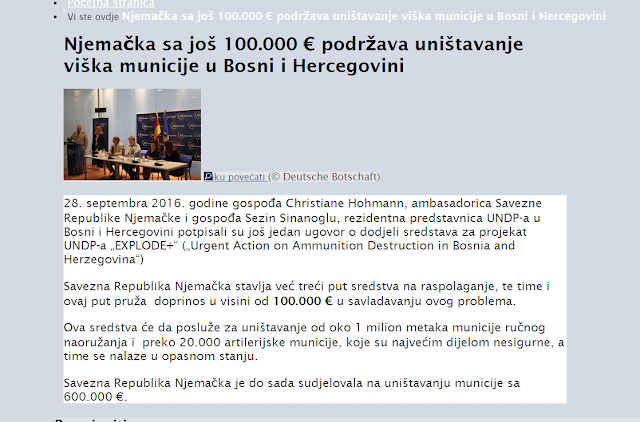090404 am
FSA5771: 03.09.2004 08:42
MORNING SERVICE
GENEVA: TOPIC MEETS BRADFORD
SARAJEVO/GENEVA, September 3 (FENA) – BiH
Deputy Foreign Minister Lidija Topic is in Geneva where she is participating in
the regional consultations following UNICEF’s Conference on Children’s Rights,
which took place in Sarajevo May 13 to 15, as well as the Conference Dedicated
to Children in Berlin in 2001.
Topic
on Friday met with the Deputy Director of the Global Fund for Aids,
Tuberculosis and Malaria (GFATM), Herbert Bradford, was announced by BiH
Ministry of Foreign Affairs.
Talks
focused on BiH’s application for receiving financial support from the Fund for
battling and treating AIDS.
GFATM
disposes with US$ 3.2 billion divided on 132 countries of the world, which are
intended for preventing and battling AIDS, tuberculosis and malaria.
BiH
is not a country with a great number of infected persons, but is regarded as a
country of high risk.
(Fena)
gk
----------------------------
FSA5772:
03.09.2004 08:51
MORNING
SERVICE
CAVIC
AND MICIC HANDED KEYS TO 23 APARTMENTS IN MODRICA
MODRICA,
September 3 (FENA) – RS President Dragan Cavic and Minister of Labour and Veterans-Invalids’
Protection Mico Micic on Friday in Modrica handed keys of 23 apartments to the
families of fallen members of RS Army and military invalids from the so-called
priority groups.
The
ceremony was attended by representatives of Modrica Municipal administration
and representatives of Entity veterans’ associations.
The
funds for building the housing units for the families of the most endangered
veterans’ categories in Modrica were insured by the local administration and RS
Government.
(Fena)
gk
----------------------------
FSA5775:
03.09.2004 09:01
MORNING
SERVICE
FBiH
REGULATORY COMMISSION FOR ELECTRIC ENERGY SESSION ON SEPTEMBER 14
MOSTAR,
September 3 (FENA) – FBiH Regulatory Commission for Electric Energy (FERK) will
hold its first session on September 14 in Mostar.
The
Commission was formed in accordance with the Law on Electric Energy with the
aim of disabling monopoly in the electro-energetic sector, realizing electric
energy production and disabling third parties from accessing the distribution
network, was announced by FERK.
(Fena) dps
----------------------------
FSA5777:
03.09.2004 09:31
MORNING
SERVICE
COLAK
DENIES CLAIMS THAT OSAMA BIN LADEN’S MESSAGE WAS DISCOVERED IN BiH
-
There is not a single information or a shred of evidence to support such
claims, and this is not the first time we have spreading of groundless claims
of this kind, which are aimed at presenting BiH as a base of terrorists, and
there were all found to be incorrect, Colak told BH Radio 1.
The
text of RIA analyst Vladimir Simonov announced yesterday states that the
American investigators have recently found a source of financing the Chechen
gangs in Chicago Chechnya
“In
searching the Bosnian branch of this foundation the investigators discovered a
simple, written by hand, order of Osama bin Laden ‘it is time to attack
Russia’, Simonov wrote on Thursday for RIA News.
(Fena)
bdz
----------------------------
_
<
_
MARKETING
- tel/fax: 033 445 346; mob: 061 200 527; e-mail: marketing@fena.ba IT FENA -
e-mail: otprema@fena.ba; fena-info@fena.ba









